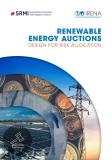Publications
Main Report | Annexes | Interactive Version | Video
During this period, ESMAP focused its efforts on addressing three compounded challenges facing developing countries: the COVID crisis; the urgent need to decarbonize; and achieving universal access to electricity. To assist clients with their COVID-19 response and recovery, ESMAP supported the sustainable electrification of health facilities, the provision of climate-friendly cold chains, and the establishment of a relief fund for off-grid solar companies in Africa.
ESMAP’s activities to accelerate the global transition to low-carbon energy and to secure universal access to energy have centered on the just transition away from coal, and ways to support the rapid deployment of renewables, including mobilization of climate finance through initiatives such as the Cooling Facility and the Sustainable Renewables Risk Mitigation Initiative (SRMI).
In addition to the dynamic response to these critical global issues, ESMAP has carried on its fundamental role in implementing its business plan based on client demand.
Energy Sector Management Assistance Program (ESMAP) Annual Report 2021 (English). ESMAP Annual Report Washington, D.C. : World Bank Group. http://documents.worldbank.org/curated/en/615511640189474271/Energy-Sector-Management-Assistance-Program-ESMAP-Annual-Report-2021




